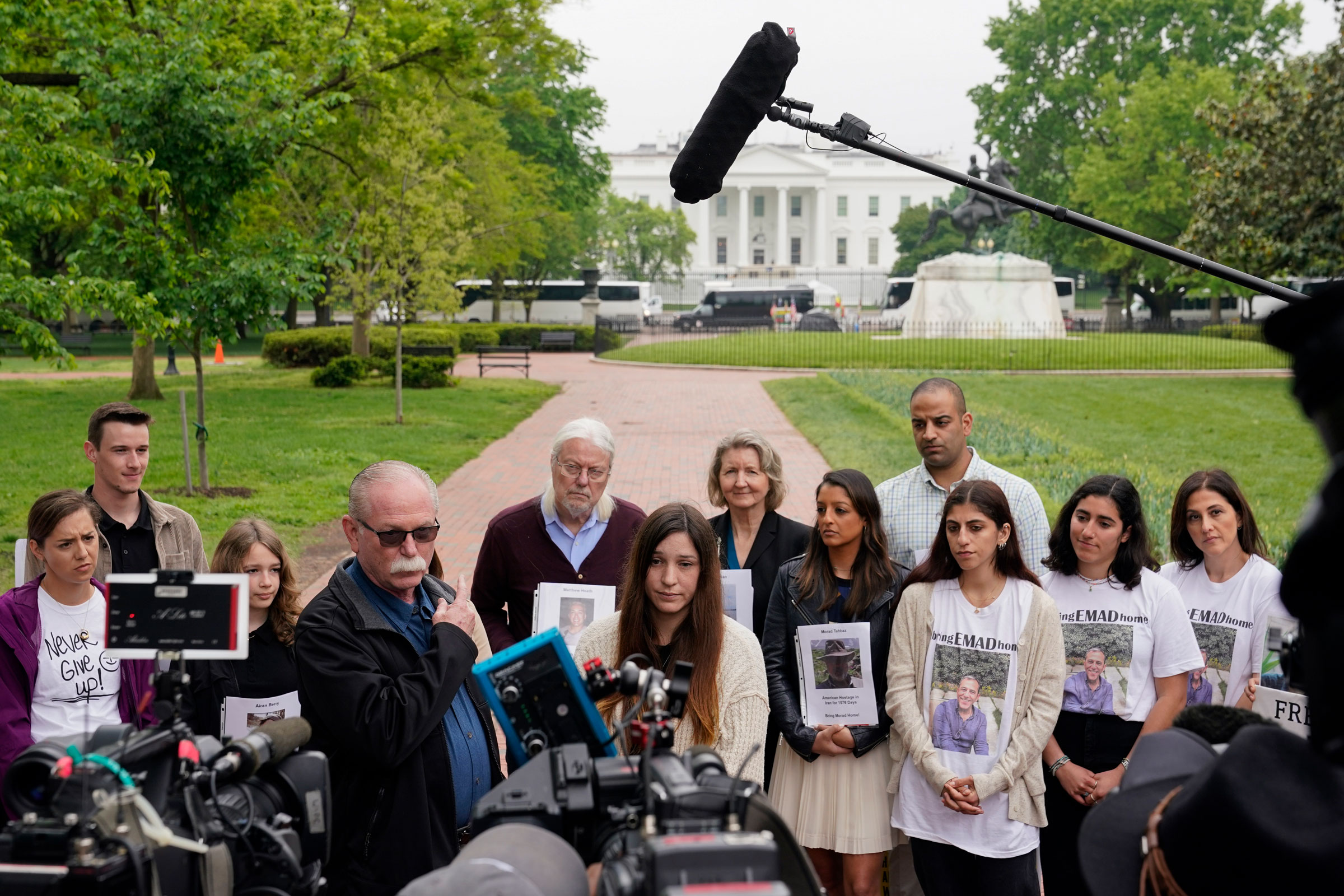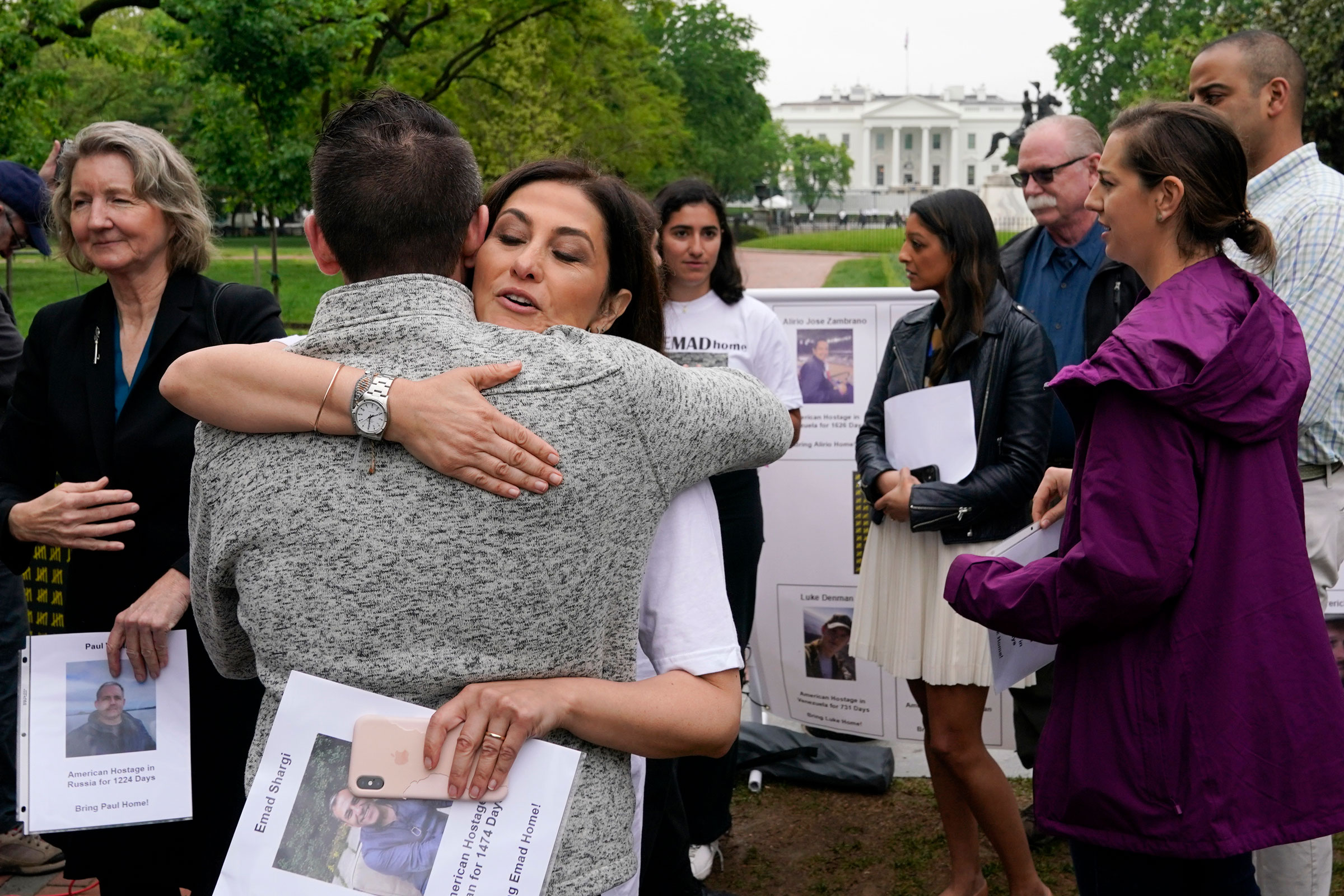
Alexandra Forseth has made eight pilgrimages to Washington during the past four years. The 30-year-old once again made the trip this week from her home in San Diego to push the White House to secure the release of her father and uncle, who have been imprisoned in Venezuela since November 2017 on what the U.S. government says are trumped-up corruption charges.
This time, Forseth had back-up. More than a dozen family members of Americans being held hostage or wrongfully detained in Russia, Afghanistan, Rwanda, Iran, and Venezuela gathered outside the White House on May 4 as part of a new “Bring Our Families Home” campaign. Standing in the drizzle, they held photographs of their family members and stated their request: a meeting with Joe Biden, which they say would help spur action by showing the U.S. President is aware of these cases and serious about bringing their loved ones home.
The families believe that the White House has failed to use all the tools at their disposal, and say that Biden’s direct engagement can break the stalemate. “We share a pattern of indecision from our Administration to bring our family members home, and we’re running into the same roadblocks,” Forseth told a small crowd of reporters and supporters. “We all come back from our meetings in D.C. crying on planes, calling [anyone] who can give us perspective on what we just heard. And we all end up figuring out the same thing: we have to get to President Biden.”
Read More: 6 Americans Imprisoned in Venezuela Are Hoping COVID-19 Brings Them Home.
The families of detained Americans were joined by the father and sister of Trevor Reed, a U.S. Marine Corps veteran who spent nearly three years in a Russian jail on charges of assaulting police before being released in a prisoner swap last week. Joey Reed said his son was upset about the continued detention of Paul Whelan, a fellow Marine who was arrested on suspicion of espionage in Moscow in 2018. Trevor Reed insisted his family come to Washington to stand with those of Americans still being held abroad.
“The reason these things take so long is two things: it’s politics, and then all the debate about how it will lead to more Americans being taken hostage,” Joey Reed said. “Americans are always going to be taken hostage, because of what we represent, and how we’re involved in everybody else’s business.”
At least 16 of 55 Americans detained abroad could be freed through prisoner exchanges, campaign organizers said. “In some circumstances, that’s the only way we can get our people back,” Joey Reed said. “So it just needs to be something that they consider more often.”
Read More: What Trevor Reed Reveals about Joe Biden’s Cautious Approach to Releasing American Hostages.
Reed’s release, as well as Biden’s meeting earlier this week with the family of Austin Tice, an American journalist abducted while reporting in Syria in 2012, has spurred these families to ramp up the pressure. Relatives told TIME they had been inspired by the example set by Reed’s parents, who relentlessly sought a meeting with Biden, waiting for hours in the cold outside the White House as well as outside an event attended by the President in Fort Worth, Tex., before finally getting a meeting in March.
“I have to say, I feel like I’ve met with President Biden and Secretary [of State Antony] Blinken,” said the sister of Emad Shargi, an American held in an Iranian prison since 2018, “because I dream at night about being in meetings with them.”

The families began working together after a long-sought call with White House National Security Adviser Jake Sullivan last December. “That was the first time that we really felt like we were hearing each other having similar issues with the new Administration,” Forseth told TIME. In follow-up discussions, she says, “we all realized that nothing’s going to happen unless Biden actually decides to make things happen.”
The Biden Administration’s approach has presented a contrast with former President Donald Trump, who relished talking publicly about his track record in bringing Americans home as part of his “America First” foreign policy. The families of detained Americans say they believe Biden is being “sheltered from this issue” and blocked from engaging with them directly. They believe advisers worry the president’s reputation for empathy might lead him to act emotionally in a politically charged context.
The White House says its national security team is regularly in touch with the families. “We will continue to pursue all avenues, to include engaging anyone, including direct engagement, to secure the return of U.S. hostages and wrongfully detained persons,” a White House official told TIME in a statement. “That said, every case is unique and every case is very difficult, and we understand the frustration and heartache these families feel.”
Read More: Why Families of U.S. Hostages Overseas Are Growing Frustrated With Biden.
That is little comfort to the families, some of whom have had to upend their lives to dedicate themselves to navigating bureaucratic roadblocks and lobbying lawmakers. “It’s emotionally devastating, it’s financially devastating,” said Everett Rutherford, the uncle of Matthew Heath, a U.S. Marine veteran from Tennessee who was imprisoned in Venezuela in 2020 for charges including “terrorism” and arms trafficking. “We’re frustrated. We’re just normal people who are having to navigate waters we’ve never encountered before.”
“It’s like entering a labyrinth, where you have no idea how to get out,” said Paul Whelan’s sister, Elizabeth, as other family members around her nodded. “We need our governments to help us get our loved ones home. This is not something that families can do themselves. We cannot go and talk to these foreign governments.”
Forseth’s father and uncle are two of the so-called “Citgo 6,” American employees of the U.S. subsidiary of Venezuela’s state-owned oil giant, who were detained during a business trip in Nov. 2017. The group had been granted house arrest last April in what was widely seen as a goodwill gesture from Venezuelan President Nicolas Maduro to the recently inaugurated Biden. But they were once again imprisoned in October in a move perceived as retribution for the U.S. extradition of Alex Saab, a Colombian financier with close ties to Maduro. Although one of the men was released in March following the first high-profile visit by U.S. officials to Caracas in three years, family members say the rest of the Citgo 6 continue to be detained as political bargaining chips.
For the first year her father and uncle were imprisoned, Forseth had to switch to part-time work at her job as an engineer with ExxonMobil in Houston in order to deal with the diplomatic bureaucracy and push to keep the case in front of politicians and the public. “If I honestly, truly felt like the White House was diligently bringing up these cases to the President on a regular basis and coming up with a strategy,” she said, “then I think I’d be less scared.”
Reed’s return was viewed by some as a sign that the administration had shifted course. “Trevor Reed’s release is a fantastic example of the Biden Administration putting patriotism over politics,” Rep. August Pfluger, a Texas Republican who represents Reed’s home district, told TIME. “I hope the momentum from Trevor’s homecoming will help compel the Administration to ensure every American can be reunited with their families.”
Yet privately, some family members of others detained abroad say that while they’re happy for Reed’s return, they also fear that it may dampen the urgency for the Biden Administration to do more for their own loved ones. They also say the case is proof that it takes a mix of geopolitical timing and dumb luck for the White House to break the “pattern of indecision” that has kept them in limbo.
Several families brought up the Levinson Act, a law adopted in 2020 which obligates the U.S. government to work for the release of U.S. nationals. It is named after Robert Levinson, a former FBI agent who vanished in Iran in 2007 and is presumed dead. “This law was written in blood so that people wouldn’t die abroad because the government doesn’t know how to dynamically respond to hostage diplomacy issue,” Forseth told TIME.
Read More: Trevor Reed’s Release From Russia Renews Questions About Brittney Griner’s Detention.
The families say they were encouraged that the U.S. government this week designated WNBA star Brittney Griner as “wrongfully detained,” two months after she was taken into custody in Russia after being accused of having drugs in her luggage.
But none of these positive steps amount to a coherent strategy, according to family members, who say they often know more than the government officials in charge of their cases and are frustrated by the pace of progress. “Without a final decision from the White House to use the tools at their disposal, our loved ones are left to rot in foreign jails with no end in sight,” the event organizers said in a joint statement.
This view is shared by some lawyers and advocates who work on hostage negotiations. “I am concerned that full implementation of the Levinson law is not happening, and some U.S. officials are falling into the ‘optics trap’ without a clear policy and goal-oriented approach,” says Jason Poblete, a Washington-based attorney who has represented U.S. citizens held hostage abroad, including members of the Citgo 6. “The goal must be to bring Americans home, not generate media stories.”
While the White House has not yet responded to the request for a meeting with Biden, the families are hopeful that their joint campaign will break through. For now, Forseth says she’s keeping in mind the words her father scribbled in a handwritten note that was delivered to her family by a U.S. official in March: “The universe continues to move and align. Please keep strong, we are close.”
More Must-Reads From TIME
- The 100 Most Influential People of 2024
- The Revolution of Yulia Navalnaya
- 6 Compliments That Land Every Time
- What's the Deal With the Bitcoin Halving?
- If You're Dating Right Now , You're Brave: Column
- The AI That Could Heal a Divided Internet
- Fallout Is a Brilliant Model for the Future of Video Game Adaptations
- Want Weekly Recs on What to Watch, Read, and More? Sign Up for Worth Your Time
Write to Vera Bergengruen at vera.bergengruen@time.com